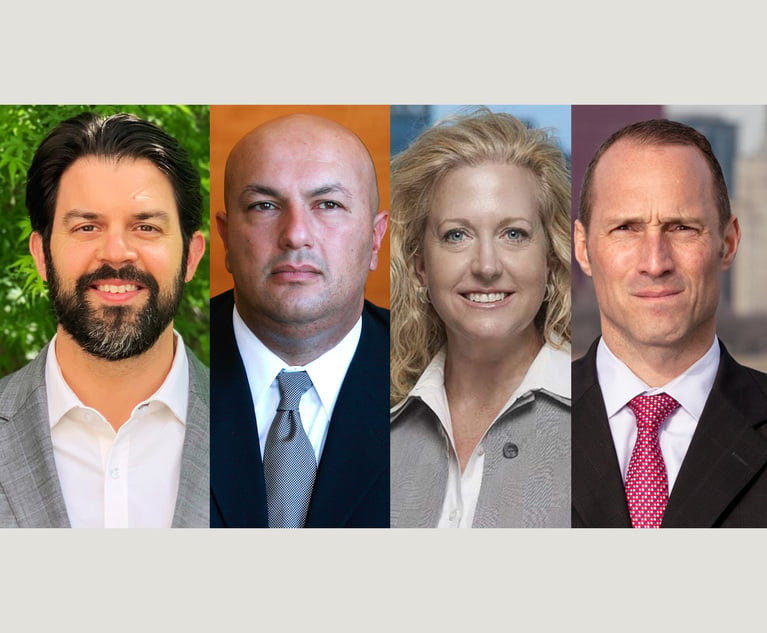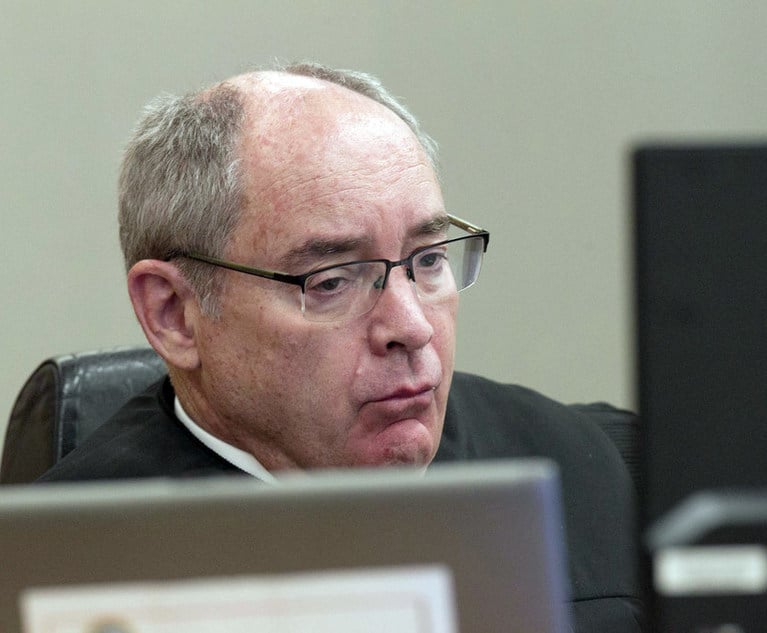 Lightspring/Shutterstock.com
Lightspring/Shutterstock.comThe NJ Hemp Farming Act Presents Opportunities and Challenges
Hemp production and sales are poised to take off due to the convergence of two recent events: the enactment of the federal Agricultural Improvement Act (the 2018 Farm Bill) and the New Jersey Hemp Farming Act (NJHFA).
September 27, 2019 at 10:00 AM
7 minute read
Hemp production and sales are poised to take off due to the convergence of two recent events: the enactment of the federal Agricultural Improvement Act (the 2018 Farm Bill) on Dec. 20, 2018, and the New Jersey Hemp Farming Act (NJHFA) on Aug. 9, 2019. N.J.S.A. 4:28-6 et seq. While these initiatives provide opportunities, they also present challenges that will need to be addressed.
|Hemp Use and Regulation History
Hemp, also commonly referred to as industrial hemp, has had a long and storied history. Its earliest known use, some 10,000 years ago, was for fabric production. In the ensuing centuries hemp has been included in more than 25,000 commercial and industrial products such as fibers, textiles, paper, construction and insulation materials, cosmetics and animal feed. Its resins have been used to produce cannabidiol (CBD) which recently has been the subject of seemingly overblown health benefit claims.
Despite its innumerable beneficial uses, hemp, a strain of the Cannabis sativa plant, has been associated with marijuana, a very different variety of the same plant species. The key difference is in tetrahydrocannabinol (THC) levels, the cannabis plant's primary psychoactive (or "high" inducing) chemical. Hemp's THC concentration is limited in the federal and state laws to 0.3%, which is not psychoactive. In contrast, marijuana's THC levels have varied from less than 2% prior to the 1990s, to more than 20% in some currently marketed strains.
The plant is grown around the world and was cultivated in the U.S. during the colonial period. But it was mistakenly conflated with marijuana in the federal Marihuana Tax Act of 1937 and subjected to onerous taxation and licensing requirements.
Over time, the pressure to relax restrictions on hemp farming increased. The 2014 Farm Bill authorized state agricultural departments and universities to grow and cultivate industrial hemp in connection with pilot programs and for research purposes. The N.J. Industrial Hemp Pilot Program, approved on Nov. 21, 2018, was designed to implement the federal authorization. N.J.S.A. 4:28-1 et seq. (subsequently repealed).
The state's pilot program law was promptly overtaken on Dec. 20, 2018, by the 2018 Farm Bill's hemp provisions. 7 U.S.C.A. 1639o et seq. The federal law facilitated hemp production by removing hemp with less than 0.3% THC from Controlled Substances Act regulation and conditionally authorizing state hemp regulatory programs.
NJHFA was designed to authorize the delegation of hemp regulatory authority to the state and tracks the 2018 Farm Bill's hemp program provisions. The following reviews the authorization and its implications.
|NJHFA's Provisions
- Section 1. The statute's title is the New Jersey Hemp Farming Act.
- Section 2. The legislative finding and declaration recognized that hemp is a viable agricultural crop and commodity that must be cultivated, handled, processed, transported, and sold in compliance with federal law. Its purposes include promoting hemp cultivation, hemp processing and developing commercial markets.
- Section 3. Key definitions include: federally defined THC level for hemp – not more than 0.3% on a dry weight basis; hemp – the plant, its derivatives, extracts and cannabinoids with a THC level of not exceeding 0.3% qualify as an agricultural commodity, not a controlled substance; hemp product – including finished products derived/processed from hemp contained in cosmetics, personal care products, food intended for consumption, cloth, cordage, fiber, fuel, paint, paper, particleboard, plastics, etc.; and hemp producer – a person or business authorized by the N.J. Department of Agriculture (NJDA) to cultivate, handle, or process hemp.
- Section 4. It's lawful for a hemp producer or its agent to cultivate, handle, or process hemp or hemp products and it's lawful to possess, transport, sell, and purchase legally-produced hemp products. NJHFA does not authorize violations of federal or state law or the applicable rules. A person/entity that is not a hemp producer or its agent, who cultivates, handles, or processes living hemp plants, seeds, leaf materials, or floral materials, shall be subject to the penalties applicable to marijuana.
- Section 5. NJDA is the primary regulatory authority concerning hemp production. It is directed to adopt rules and submit them and the statute to USDA as the state's plan for monitoring/regulating hemp production. The rules must include testing provisions to assure compliance with the hemp THC limits; procedures for disposal of nonconforming plant material, enforcement provisions and annual inspections. Plan compliance requires the state to certify that adequate resources and personnel will be available.
- Section 6. NJDA is required to adopt rules to promote cultivating and processing of hemp and commercial sale of finished products. The rules will set requirements for authorizing applicants to be hemp producers; include an appeal process to provide for challenging inaccurate test results; and provide for application, licensure, and renewal fees to cover administrative and enforcement costs.
Once USDA approves the state plan, NJDA will authorize participation in the state hemp program. Applications shall include a description of the location where hemp will be cultivated or processed; a consent to allow the NJDA and law enforcement agencies to enter those premises; and a criminal history record check on all applicants.
- Section 7. Hemp producers that violate NJHFA negligently by failing to obtain a necessary license from NJDA; producing hemp with more than the THC limit; or commit certain other violations are not subject to civil or criminal penalties but must implement a corrective action plan. Producers that commit negligent violations three times in a five-year period are barred from participation in the program for five years.
Sanctions for violations by a hemp producer with a culpable mental state greater than negligent include referral to the U.S. Attorney General and the state's attorney general for further investigation for injunctive relief, the imposition of civil or administrative penalties, or referral to law enforcement agencies. Persons convicted of a controlled substances offense are barred from the state hemp program for at least 10 years.
- Section 8. Establishes the New Jersey Hemp Farming Fund as a special nonlapsing fund to be used for NJHFA's administration and enforcement. The fund's proceeds include penalties and fees, legislative appropriations, federal funds, etc.
- Section 9. Hemp, hemp products and derivatives, including CBD, produced in accordance with the NJHFA and the applicable rules do not constitute controlled substances or additives and may be used as an ingredient in cosmetics, personal care products, or products intended for human or animal consumption. NJHFA provisions covering hemp producers do not apply to possession, handling, transport or sale of hemp products including CBD. It is lawful to possess, transport, sell, and purchase legally produced hemp products.
- Sections 10 through 14. Amend various statutory provisions to clarify that hemp or a hemp product as defined in NJHFA does not constitute marijuana.
- Section 15. Repeals the industrial hemp pilot program.
- Section 16. NJHFA took effect immediately on Aug. 9, 2019.
Reactions
NJHFA's sponsors, pleased with its approval, highlighted the new law's potential benefits. According to Senate President Stephen Sweeney (D-Gloucester): "New Jersey has the capacity and ability to capitalize on new opportunities for hemp products that will create jobs and expand economic opportunities." Assemblyman John Burzichelli (D-Gloucester) expressed a similar view: "We're bringing life to two new industries … one that will allow farmers to expand their crops to grow hemp and the other will develop an entire processing industry for hemp." NJ.com, Aug. 11, 2019.
Peter Furey, New Jersey Farm Bureau's executive director, noted that his organization, which represents the state's agricultural industry, had strongly supported NJHFA's introduction and approval. But he cautioned: "A series of challenges including seed quality and the establishment of processing facilities and bona fide marketing outlets need to be addressed to assure that hemp production will be a profitable and reliable cash crop for the state's farming community." He also observed that "the success of the hemp program is directly dependent on the release of a special $500,000 appropriation that was part of the $230 million sequestered by Gov. Murphy when he approved the FY '20 state operating budget."
Lewis Goldshore practices in Princeton. His practice is devoted to environmental, land use and municipal law. He is the author of New Jersey Environmental Law (ICLE 2010).
This content has been archived. It is available through our partners, LexisNexis® and Bloomberg Law.
To view this content, please continue to their sites.
Not a Lexis Subscriber?
Subscribe Now
Not a Bloomberg Law Subscriber?
Subscribe Now
NOT FOR REPRINT
© 2024 ALM Global, LLC, All Rights Reserved. Request academic re-use from www.copyright.com. All other uses, submit a request to [email protected]. For more information visit Asset & Logo Licensing.
You Might Like
View All

MDL Judge: 'Significant Number of Plaintiffs' Can't Allege Paraquat Exposure
8 minute read
Why the Wide Range of Roundup Verdicts? It Might Depend on What Juries Hear About the EPA
8 minute read
Roundup MDL Lead Counsel Defend Fee Allocations: 'Limited Funds Available'
5 minute readTrending Stories
- 1Judge Denies Sean Combs Third Bail Bid, Citing Community Safety
- 2Republican FTC Commissioner: 'The Time for Rulemaking by the Biden-Harris FTC Is Over'
- 3NY Appellate Panel Cites Student's Disciplinary History While Sending Negligence Claim Against School District to Trial
- 4A Meta DIG and Its Nvidia Implications
- 5Deception or Coercion? California Supreme Court Grants Review in Jailhouse Confession Case
Who Got The Work
Michael G. Bongiorno, Andrew Scott Dulberg and Elizabeth E. Driscoll from Wilmer Cutler Pickering Hale and Dorr have stepped in to represent Symbotic Inc., an A.I.-enabled technology platform that focuses on increasing supply chain efficiency, and other defendants in a pending shareholder derivative lawsuit. The case, filed Oct. 2 in Massachusetts District Court by the Brown Law Firm on behalf of Stephen Austen, accuses certain officers and directors of misleading investors in regard to Symbotic's potential for margin growth by failing to disclose that the company was not equipped to timely deploy its systems or manage expenses through project delays. The case, assigned to U.S. District Judge Nathaniel M. Gorton, is 1:24-cv-12522, Austen v. Cohen et al.
Who Got The Work
Edmund Polubinski and Marie Killmond of Davis Polk & Wardwell have entered appearances for data platform software development company MongoDB and other defendants in a pending shareholder derivative lawsuit. The action, filed Oct. 7 in New York Southern District Court by the Brown Law Firm, accuses the company's directors and/or officers of falsely expressing confidence in the company’s restructuring of its sales incentive plan and downplaying the severity of decreases in its upfront commitments. The case is 1:24-cv-07594, Roy v. Ittycheria et al.
Who Got The Work
Amy O. Bruchs and Kurt F. Ellison of Michael Best & Friedrich have entered appearances for Epic Systems Corp. in a pending employment discrimination lawsuit. The suit was filed Sept. 7 in Wisconsin Western District Court by Levine Eisberner LLC and Siri & Glimstad on behalf of a project manager who claims that he was wrongfully terminated after applying for a religious exemption to the defendant's COVID-19 vaccine mandate. The case, assigned to U.S. Magistrate Judge Anita Marie Boor, is 3:24-cv-00630, Secker, Nathan v. Epic Systems Corporation.
Who Got The Work
David X. Sullivan, Thomas J. Finn and Gregory A. Hall from McCarter & English have entered appearances for Sunrun Installation Services in a pending civil rights lawsuit. The complaint was filed Sept. 4 in Connecticut District Court by attorney Robert M. Berke on behalf of former employee George Edward Steins, who was arrested and charged with employing an unregistered home improvement salesperson. The complaint alleges that had Sunrun informed the Connecticut Department of Consumer Protection that the plaintiff's employment had ended in 2017 and that he no longer held Sunrun's home improvement contractor license, he would not have been hit with charges, which were dismissed in May 2024. The case, assigned to U.S. District Judge Jeffrey A. Meyer, is 3:24-cv-01423, Steins v. Sunrun, Inc. et al.
Who Got The Work
Greenberg Traurig shareholder Joshua L. Raskin has entered an appearance for boohoo.com UK Ltd. in a pending patent infringement lawsuit. The suit, filed Sept. 3 in Texas Eastern District Court by Rozier Hardt McDonough on behalf of Alto Dynamics, asserts five patents related to an online shopping platform. The case, assigned to U.S. District Judge Rodney Gilstrap, is 2:24-cv-00719, Alto Dynamics, LLC v. boohoo.com UK Limited.
Featured Firms
Law Offices of Gary Martin Hays & Associates, P.C.
(470) 294-1674
Law Offices of Mark E. Salomone
(857) 444-6468
Smith & Hassler
(713) 739-1250






